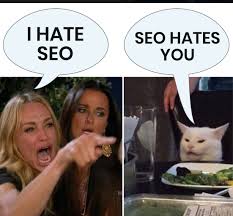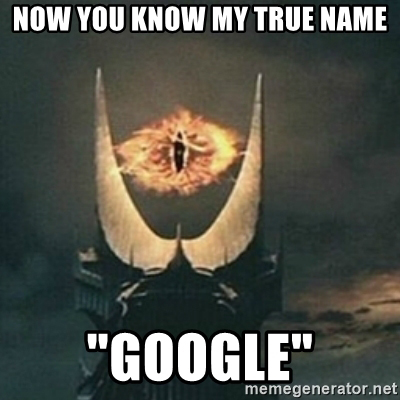SEO doesn’t have to make you want to poke your eyes out with the same fork you used to eat your salty meat and olive salad lunch.
Just know you’re not alone.

For many years, I too, felt the same way about SEO. Here’s how I used to describe it: overly technical, gross, spammy, a total snooze fest.
Basically, the exact same adjectives I use to describe other things I hate like robocalls, international money laundering and stealing from non-profits by pretending to be one and then using that money to go on a fancy European vacation.
In the Beginning was SEO and IT WAS NOT GOOD
Early SEO brought out the worst in business-to-customer communication. (Real helpful for marketing, right?)
Why, SEO, WHY??
I blame Google. At the time, the search engine preferred algorithms over real human beings.
In the beginning, getting a good SEO required companies to use some pretty awful tactics including:
- Cramming an insane number of keywords into website copy, resulting in confusing and off putting content.
- Using ridiculous techniques to “trick” the search engines, like stuffing keywords into hidden tags and the eternally clever use of white text on a white background.
- Paying out the nose for paid links and what turned out to be irrelevant directories.
I’m sure none of that seems client-centric and I would say, you are right. It wasn’t and business owners couldn’t do a damn thing about it since Google was the new sheriff in town.
After frustrating and confusing people on both sides of the B2C divide, Google got the message and cleaned up its SEO act.
Eventually, Google got the wiser and stopped awarding value to companies employing the terrible tactics above.
They started favoring the companies (and their web pages) that put quality first, particularly those that invested in and created compelling, relevant content for their audience.
Is Google really just another Sauron?
Um, yeah, didn’t I literally blame them in the last section? And who else would have a corporate motto that dictates, “Don’t be evil,” but then makes decisions that lead to populating the planet with a bunch of low-quality content?

Though I cast Google in this light, partly because I’m one of those true believers in quality content, and the irony is that they’re one of the largest, most profitable direct marketer on the planet.
However, at the end of the day, it’s the search engine that most people use, good, bad or indifferent.
So, if you’re keen on creating and publishing good content on the internet, then, you’ll have to learn how to work politely with/accept that Google is now a big part of the digital universe.
How Can You Please Google-Sauron With Your Content?
Just like Frodo, you’re probably going to want to give up in frustration. Having to fight a damn ring that’s threatening to take over your soul while at the same time battling a dark overlord that wants to obliterate it can get pretty exhausting.
Google is just another hungry beast that’s impossible to satisfy unless you give it your arm and/or your leg. (Obviously choose the meatier one. We’re on a budget here.)
Oh and did I mention that Google changes it’s algorithms all the time with no prior notice and without giving out any release notes?
A person can really run themselves ragged trying to figure out, anticipate, appease the black hole of Google.
Instead, try this brilliant and freeing strategy: Stop trying to cater to Google and the search engines.
Instead, focus on what your audience wants. They’re your true heroes in the end anyway. They buy your products and services allowing you to put food on your family’s table, support your employees and give to charity.
So…
—> Cater to them.
—> Spoil them.
—> Nurture them.
—> Show them a ton of love.
Ironically, focusing on your clients and ignoring Google tends to work best even for Google. Don’t get me started on how junior high this is, ugh whatever.
Besides, Google could be taken out by a meteor tomorrow and then what?
Your clients would still be your clients.
Put that relationship first, and you’ll end up with good SEO.
Isn’t Google Really Hard to Predict?
Yep. So, don’t bother. Next.
The following things are true:
- Google changes its SEO algorithms (covered this already)
- These changes result from good ol’ G trying to weed out spam
- Non-spam pages sometimes get sacrificed along the way
- Nobody’s perfect. Not even algorithms.
- Google’s web spam team’s motto is “Don’t publish crappy, low-quality content that no one wants to read in your effort to rank well in the search engines.”
Okay, I made that last one up, but I’m sure it’s mostly true.
“So, I got that Google is the Sauron of the digital world, which is kind of an exaggeration, but I love Lord of the Rings, so I’m cool with it. I got that it’s best to care about my clients and my content while ignoring Google…okay, so what am I actually supposed to do about my SEO?”
What Works Long Term in SEO Practices?
This is what I tell my clients:
Content! Content! Content! (This is not an exaggeration and it must be high quality.)
After I have drilled that in, I collaborate with them to generate unique and interesting writing topics that will speak to their audience.
Part of this process includes studying their data together while I enhance their understanding of good SEO techniques like how a great, benefit-rich headline works great on a blog post and for a sales page.
Next, we work together to cultivate my clients’ relationships with other industry publishers and how to be exceedingly careful on the impact some of those publishers could have on their brand reputation.
Lastly, we work out a successful SEO strategy. Here’s an overview:
- Always create content that’s both useful and interesting. (Or in the words of George B Thomas, “helpful and humble is best.”)
- Pay close attention to what questions your audience is asking and what feedback they’re giving on your products and services
- Stick to high editorial standards using attention-grabbing headlines and content formatted for an easier, quicker read (e.g. uses sub-headers).
- Evolve and update the company website’s copy (and design) to keep up with their audience’s wants and needs.
- Properly claim and create your Google My Business listing. This is a MUST for businesses who are local and regional in nature.
If you’re made it this far without feeling overwhelmed, I commend you. Typically, most of my clients start to get a bit restless after diving into SEO strategies, which is why I featured it last.
I also get that, at times, marketing can be really overwhelming, especially if you add the average burn out on top of it. Believe me, I’ve been there too.
If you’re in this place or would just love more help getting your marketing back on track, please don’t hesitate to reach out to me. I’m passionate about creating compelling content and I’m here to help.
If you’d like to hear more about how I can serve you, please see the Scott Digital Marketing website here.
We take content creation seriously so you can get on with the rest of your demanding job. I’ve been told more than once by a client, “I sleep better at night knowing that you’ve got my back.”
Got Marketing Questions? We can help.
By clicking this button, you submit your information to Scott Growth Strategies, who may use it to communicate with you regarding this and other services.
